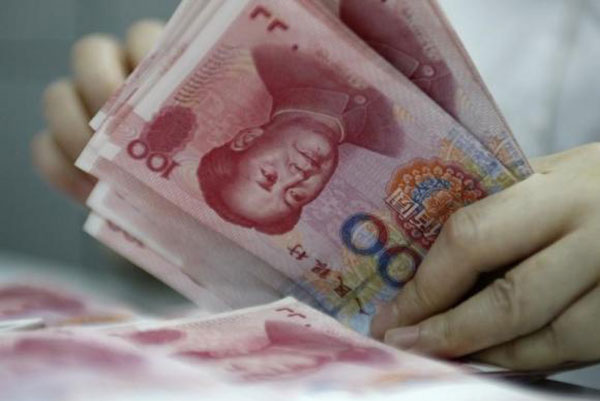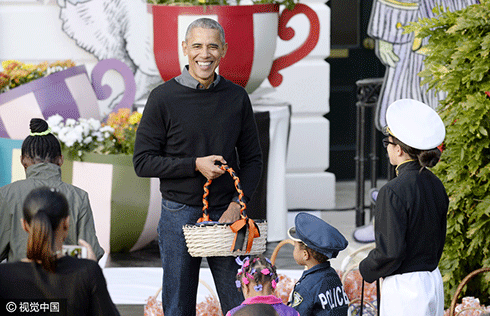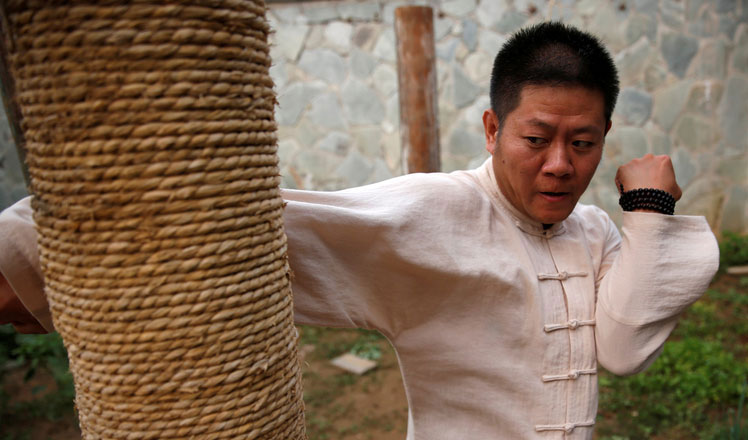Analysts says softer yuan not a sure thing
Updated: 2016-11-02 08:20
(Xinhua)
|
||||||||
 |
|
An employee counts yuan banknotes at a bank in Huaibei, Anhui province June 22, 2010.[Photo/Agencies] |
BEIJING - Despite a looming rise in US interest rates and recent exchange rate volatility, many analysts believe that persistent depreciation of the Chinese currency is not supported by the underlying fundamentals.
Passive response
The central parity rate of the Chinese currency weakened to 6.7858 against the US dollar Friday, a six-year low, according to data from the China Foreign Exchange Trade System (CFETS), triggering market worries that the currency could be about to tumble.This view has been refuted by some scholars and private economists, who believe the sharp and persistent depreciation of the yuan is unwarranted.
Major currencies experienced a depreciation against the dollar in recent weeks due to growing expectations of an interest rate hike by the US central bank. Some currencies such as the British pound registered a sharper depreciation, but the yuan was stable against a basket of major currencies, showing market confidence, said Wen Bin, chief researcher with China Minsheng Bank.
The view was echoed by Ou Minggang, director of the International Finance Research Center at China Foreign Affairs University, who suggested taking a holistic perspective.
"When measuring the value of the yuan, focus should not solely be laid on the exchange rate of the yuan against the dollar, as the yuan has performed strongly relative to some major non-dollar currencies recently," Ou said.
The CFETS yuan exchange rate composite index, which measures the yuan's strength relative to a basket of currencies including the dollar, euro and Japanese yen, firmed to 94.15 on Oct 28 from 94.07 on Sept 30.
The yuan has been confronted with downward pressure, with some investors concerned about China's waning foreign exchange reserves and slower pace of economic growth compared with previous years. But the yuan depreciated less against the dollar compared with other major currencies, Ou added.
The recent volatility of the yuan against the dollar was more like a "passive" market response to the US interest rate hike prediction in December, and is not pointing to weaknesses of China's economic fundamentals, said Chen Ying, a senior analyst at CITIC Securities.
Lmited room
Exchange rates can be jointly decided by a slew of factors, including a country's economic fundamentals, foreign exchange reserves and events affecting market sentiment, so a short-sighted view might not be useful when observing day-to-day volatility, experts suggest.
The central parity rate of the yuan strengthened sharply by 217 basis points to 6.7641 against the dollar Monday, while the dollar slipped against major currencies due to the FBI's decision to reopen its investigation into Democratic presidential candidate Hillary Clinton's emails on Friday.
The room for the dollar index, which measures the dollar against six major currencies including the euro and the British pound, to further climb this year was limited, as the news of a potential US interest rate hike has been almost fully digested by the market, Chen said.
The index touched its nine-month peak on Oct 25, advanced by a string of positive US economic data from the world's largest economy, which strengthens the rationale for an interest rate rise.
Some experts such as Wen predict that the dollar index still has some room to rise before the US interest rate increase materializes, but they ruled out the possibility of a yuan dive, citing reasons including vast foreign exchange reserves and sound fiscal conditions.
There is no basis for persistent yuan depreciation, as China has been witnessing steady economic growth, progress in economic restructuring and a stable financial market, said Pan Gongsheng, head of the State Administration of Foreign Exchange (SAFE), on Monday.
China's forex reserves lowered for the third consecutive month to $3.166 trillion at the end of September, but that would still cover about 24 months of China's imports, much higher than the commonly-used global reference standard of three to four months, said Guan Tao, a senior fellow at the China Finance 40 Forum and former SAFE official.
Despite the difficulties in transitioning successfully to a consumption and innovation-driven economy, China's GDP grew 6.7 percent in the third quarter, holding steady with the second quarter and outpacing many major economies.
After so much depreciation since August 2015, further depreciation of the yuan is not a sure thing, as China's market share of global trade keeps growing, said Sridhar Kanthadai, managing director and head of transaction banking for Greater China and North Asia at Standard Chartered Bank.
Kanthadai predicted the exchange rate of the yuan against the dollar on the onshore market to reach around 6.75 by the end of the year, noting that reserves diversification into yuan assets and portfolio inflows could partially offset a rise in household outflows.
Other organizations also forecast a similar trend, with Singapore's DBS predicting the exchange rate of the yuan against the dollar on the onshore market to sit at around 6.72 by the end of the year.
- Regular China-South Asia freight train launched
- Police swoop on Paris migrant camp after Calais Jungle clearout
- Regular China-South Asia freight train launched
- South Korean prosecutors arrest woman at centre of political crisis: media
- EU, Canada sign landmark deals to enhance economic, political partnership
- Wife raises funds to search for missing sailor

 Obamas host White House Halloween for children
Obamas host White House Halloween for children
 China Fashion Week: Liu Yong Exclusive
China Fashion Week: Liu Yong Exclusive
 Top 5 collaborating countries in Belt and Road Initiatives
Top 5 collaborating countries in Belt and Road Initiatives
 Hand-carved buckets face possible extinction in Zhejiang
Hand-carved buckets face possible extinction in Zhejiang
 Jet fighters and bombers ready for Air Show China
Jet fighters and bombers ready for Air Show China
 The World in photos: from Oct 24 to Oct 30
The World in photos: from Oct 24 to Oct 30
 Through the lens: The life of a kung fu master
Through the lens: The life of a kung fu master
 In pics: Top 10 Chinese cities in 2016
In pics: Top 10 Chinese cities in 2016
Most Viewed
Editor's Picks

|

|

|

|

|

|
Today's Top News
US election rhetoric unlikely to foreshadow future US-China relations
'Zero Hunger Run' held in Rome
Trump outlines anti-terror plan, proposing extreme vetting for immigrants
Phelps puts spotlight on cupping
US launches airstrikes against IS targets in Libya's Sirte
Ministry slams US-Korean THAAD deployment
Two police officers shot at protest in Dallas
Abe's blame game reveals his policies failing to get results
US Weekly

|

|









